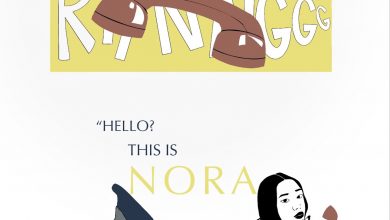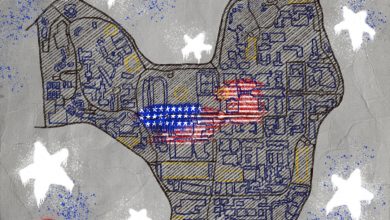Ode to Samantha Bee: How “The Daily Show” correspondent is saving the world, one joke at a time
 It’s very easy to turn left or right and find a political satirist, such as Jon Stewart or Stephen Colbert, talking about issues hitting America. But no one does it like Samantha Bee. Hailing from Ontario, Canada, Bee has made a name for herself with her quick wit on “The Daily Show with Jon Stewart.” But, even before joining the Daily Show in 2003, Samantha Bee was already a storm of a comedienne. While still in Canada, she was one of the co-founding members of the sketch comedy troupe The Atomic Fireballs, On “The Daily Show,” she stands out as a fantastic comedian because of the different personas she adapts to emphasize her points. Not only does she try to make the audience laugh, but she also gets you to think about real life absurdities and learn from the ridiculous truth.
It’s very easy to turn left or right and find a political satirist, such as Jon Stewart or Stephen Colbert, talking about issues hitting America. But no one does it like Samantha Bee. Hailing from Ontario, Canada, Bee has made a name for herself with her quick wit on “The Daily Show with Jon Stewart.” But, even before joining the Daily Show in 2003, Samantha Bee was already a storm of a comedienne. While still in Canada, she was one of the co-founding members of the sketch comedy troupe The Atomic Fireballs, On “The Daily Show,” she stands out as a fantastic comedian because of the different personas she adapts to emphasize her points. Not only does she try to make the audience laugh, but she also gets you to think about real life absurdities and learn from the ridiculous truth.
When I started watching “The Daily Show, I had no idea that Bee was of the only female correspondents. But even so, I thought of her as simply one of the sharpest and funniest actors on the show. I didn’t single her out because of her gender, but because I felt a connection to her satirical style of journalism which played upon stereotypes.
When I first saw Bee doing an interview titled “They So Horny?” I was immediately drawn in by her ability to cleverly lead her subject into caricaturing himself. The video follows a UC Davis professor who lamented the lack of Asian actors in pornography. The subject in itself is quite astonishing, but even more surprising is watching Bee actually going to a pornography film producer and asking ridiculous questions in order to highlight the professor’s absurdity. Afterwards, she pays a visit to Star Trek actor George Takei, famous for his portrayal of Sulu, and asks him to do a porno film to help diversify the range of porn actors in the industry. Even funnier is that she appeals to him as if this was a legitimate and important cause, like say, saving the rainforest. From that moment on, I looked forward to her appearances in “The Daily Show.”
I got to enjoy her comedic abilities again when she did segment on a smoking ban in New York City parks that was meant to create better and safer outdoor spaces. As she interviews various citizens about their support on this smoking ban, various people who could be considered by some as “unsavory” (they stare, scream, drink alcohol and even smoke) roam about, contradicting everything that the supporters of the ban are talking about. The irony is instantly visible in one scene where she talks to a supporter of the ban who claims that the parks are now safer, only to have two men behind them start hurling expletives at each other. “Don’t get stabbed,” whispers Bee, thus highlighting the absurdity of the situation. This is the kind of hilarious and effective humor Bee is incredibly good at creating. Later on in the clip, she suggests having a picnic since the place is so safe, only to have her interviewee tells her it is illegal to walk on the grass. “So this [park] is just for show?” asks Bee. Revealing the disparity and lack of priority for other pressing concerns is what Bee does best.
After this segment I realized that, despite being one of the only female correspondent on the show, she is not just limited to women’s issues or pigeonholed into a type of comedian because of her gender. Like the rest of the male correspondents (one of whom is her husband) she has the guts to sit down with government officials and tackle any issue and make it hilarious. She gives her journalistic abilities and “fake news” a new spin. When Jon Stewart addresses women issues currently debated in Congress, Bee takes the stand. It’s shocking how the majority of people mak- ing decisions related to women’s health, among other rights, tend to be male.
In one segment titled, “V-Jay Jay Day” Bee gives her controversial and satirical remarks on women in the U.S. Army. She ridicules the female commentator who made regressive comments on why women in the army become a problem for the men in the army. Adapting a damsel in distress persona, Bee sits down patiently and coyly, but bluntly states how obvious it is that there are only going to incite two responses from men, either protective or aggressive. If during combat a male soldier sees a female soldier he becomes distracted by her because he wants to protect her; if he does not want to protect her, then the male soldier wants to rape her, and according to the female commentator, she distracts the soldier this way too. Although her seeming agreement with the commentator aroused controversy, Bee’s demeanor and hy-perbolic language, her face expressions and gestures signified the contrary. By adopting that side of the argument, she emphasized how obviously wrong both statements were – something that might not have been apparent if she didn’t exaggerate them.
Bee doesn’t merely take strong opposition, but uses humor and satire to reveal the disparity between higher authorities and supposedly educated representatives in a relaxed way. The unnerving subjects of some of her conversations with others might outrage you, but with her great humor, unthreatening appearance, and sharp wit, you can laugh it all out with irony.




